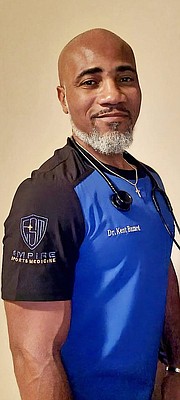By Dr Kent Bazard
IN the world of sports, the spotlight often shines brightest on the athletes themselves. Yet, behind every touchdown, slam dunk, and home run, there’s a team of dedicated professionals working tirelessly to keep the players in top form. Among these unsung heroes are the athletic trainers, whose crucial role in ensuring athlete health and safety cannot be overstated.
Origins of Athletic Training
The roots of athletic training can be traced back to the early 20th century, a time when organised sports began to flourish and the need for specialised healthcare for athletes became apparent. As sports gained prominence in educational institutions and professional leagues alike, the demand for professionals with expertise in sports medicine and injury prevention grew exponentially.
Rise of Athletic Trainers
Today, athletic trainers are integral members of sports teams at all levels, from high school to the professional ranks. Armed with comprehensive knowledge of anatomy, physiology, and biomechanics, these skilled professionals play a multifaceted role in athlete care. They assess injuries, develop rehabilitation programs, provide emergency medical treatment, and educate athletes on injury prevention strategies.
A Day in the Life of an Athletic Trainer
On any given day, athletic trainers can be found on the sidelines of practice fields, courts, and stadiums, ready to spring into action at a moment’s notice. Their duties extend far beyond the confines of game day, encompassing everything from injury prevention screenings to post-game recovery sessions. Athletic trainers work closely with coaches, team physicians, and physical therapists to ensure that athletes receive the comprehensive care they need to excel.
Education and Training
Becoming an athletic trainer requires a rigorous educational process. Most athletic trainers hold a bachelor’s degree in athletic training or a related field, followed by certification through the Board of Certification for the Athletic Trainer (BOC).
Additionally, many pursue master’s or doctoral degrees to further specialize in areas such as sports medicine or exercise physiology. Continuous education and professional development are essential for staying current with the latest advances in sports medicine and injury prevention.
The Unsung Heroes
While individual profiles of athletic trainers offer compelling insights into their dedication and expertise, it’s the collective efforts of these professionals that truly underscore their importance.
Whether they’re taping ankles, providing first aid, or guiding athletes through rehabilitation exercises, athletic trainers are the unsung heroes who keep sports teams functioning at their best.
Conclusion: Celebrating Athletic Trainers
In conclusion, the invaluable contributions of athletic trainers to the world of sports cannot be overstated. As we applaud the feats of athletes on the field, let’s also take a moment to recognize the behind-the-scenes efforts of these dedicated professionals.
Their commitment to athlete health, safety, and performance is truly worthy of praise and appreciation.





Comments
Use the comment form below to begin a discussion about this content.
Sign in to comment
OpenID